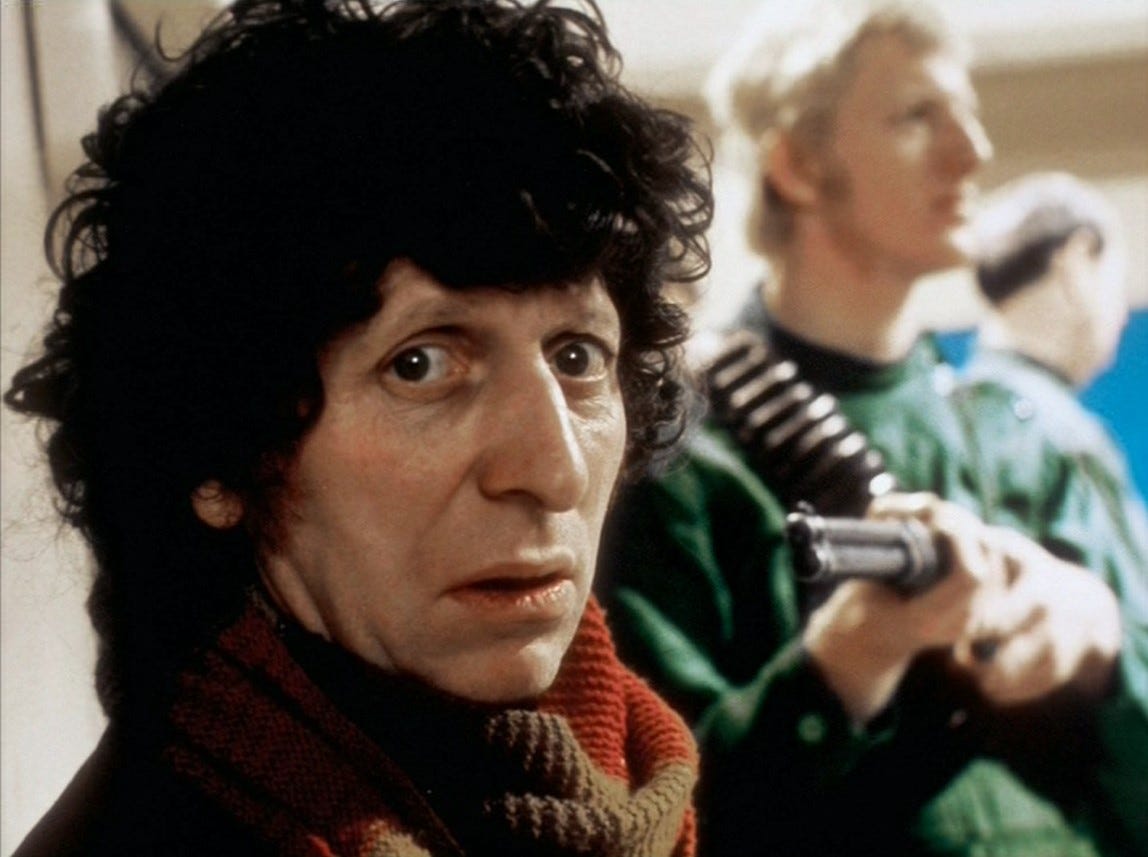Genesis of the Daleks is a great Doctor Who story. I can easily disregard its few well-known flaws in production and enjoy it regardless. However, there’s one element which irritates me every time. I first noticed it when discovering the story on audio thanks to the LP release, and its wrongness is all the more obvious in the full television version.
It’s the bit in which, following the destruction of the Kaled dome, the Thal leader orders that all prisoners (meaning Kaleds) are immediately released, saying: “Let us now show that whilst we were ruthless in war, we are generous in victory.” This is a magnanimous gesture indeed. However, it’s ridiculous in context. This comes mere seconds after what appears to be the winning blow in the conflict. But there has been no surrender from the Kaleds, nor is it clear whether surviving military forces outside the dome or in the bunker beneath it are planning to fight on, although it’s hard to imagine anything but a last-man-last-bullet scenario given the nature of the war.
Letting prisoners go instantly, and within the Thal dome itself (as they do with the Doctor, who they must believe to be a Kaled) would seem a massive security threat. Surely at least some of these ex-prisoners would be expected to seek revenge or attempt sabotage. Who would mope meekly around the heartland of his enemy when they had just annihilated his home and people?
The Thal leader even states that all charges against prisoners are to be dropped, which suggests that at least some of their captives are not just enemy combatants, your bread-and-butter prisoners of war, but are accused of crimes which, in the circumstances of this war, must have been heinous to be beyond ordinary conduct. Do they want such people to not only walk free but to be seen to remain unpunished for their (perceived or real) offences?
The very idea of such a prisoner release – seemingly written in as a lazy way to have the Doctor’s liberty restored – undermines the whole compelling background of the Thal/Kaled conflict, which is one of the story’s strongest elements. Over the preceding episodes we have been shown a world in which two civilisations wage total war, seemingly driven by blind racial hatred. Life is cheap. Prisoners, when rarely they are taken, are executed or worked to death as slave labour. Total extermination of their opponents is the aim of each side. There is no suggestion than any form of coexistence is conceivable.
The events of the story occur after a thousand years of this conflict; neither race knows any other way of life. It is not credible that either side could show such sudden generosity and openness to a foe they had lived to annihilate, even after a substantial passage of time. It is all the more incongruous when we see the Doctor, presumably recognised as a released prisoner (he certainly couldn’t pass for a Thal), being greeted in friendly fashion by jubilant Thal troops.
It’s as if at this point, with the Thal-Kaled war apparently ended, the story is moving from its horrific and violent territory back onto Doctor Who’s more conventional fantasy-adventure ground. But it seems not, as Dalek massacres of both Thals and Kaleds are just around the corner.
It may seem churlish to whinge about such a small matter and it’s only because the rest is so good that it’s notable. For me, it ruins the credibility of the setting, wrecking much of the impressive work done by the writing, performance and design in previously establishing this so well.
Images © BBC
This is an updated version of an article originally published in Panic Moon in October 2010.





I understand what you are saying, however I think it is a really “Doctor Who-ey” moment. Sure it’s a bit naive and idealistic but the two races had severe war fatigue. We could do with some of our world’s leaders de-escalating conflict right now. Someone has to start. And on Skaro - a brave new world was (hopefully) starting. But then the Daleks arrived...
War fatigue would be a given after a generation of conflict. I love the optimism and grace of the Kaled leader. If only we had some here on Earth.